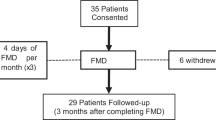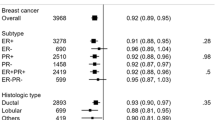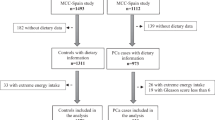Abstract
While there are emerging reports in the scientific literature on potential associations between cholesterol/lipids and prostate cancer, information on the dietary management of these cancer patients is currently lacking. We report on a 57-year-old white Australian male diagnosed with advanced prostate cancer who had personalized dietary management in preparation for and following his medical treatment: radiation and radical prostatectomy. Dietary recommendations were based on his blood results and nutrigenomic tests which showed a history of and genetic predisposition to dyslipidemia. Nutritional analysis also confirmed the need for dietary modification of his fat intake. Eighteen months post medical and dietary intervention his PSA level was reported at 0.1 ug/L and all blood lipid levels were within reference ranges. At two years there was no detectable disease recurrence and androgen deprivation therapy (ADT) was not required. Personalized dietary recommendations could be a clinically beneficial addition to the multidisciplinary management of prostate cancer patients.
Similar content being viewed by others
Introduction
Established risk factors for prostate cancer currently include: age, family history, ancestry, and genetics [1]. Modifiable risk factors include maintaining a healthy body weight, with the evidence for the role of diet in the etiology of prostate cancer still equivocal. According to the World Cancer Research Fund’s Continuous Update Project, the current level of evidence for diet is limited and suggestive only for a potentially increased risk of prostate cancer associated with a high intake of dairy and calcium foods, and low plasma levels of selenium and alpha tocopherol [1]. No other dietary factors are currently considered to have sufficient evidence to suggest either a protective or harmful influence on the development of prostate cancer, although there is emerging evidence to suggest that cholesterol which acts as a substrate for steroid hormone biosynthesis and lipid metabolism may have a role in prostate cancer cell growth, proliferation and progression [2, 3]. Dysregulation of lipid metabolism has been reported as a hallmark of prostate cancer progression with prostate cancer cells having an increased demand for de novo lipogenesis [2,3,4].
Here we report on a relatively young, active male who had no significant medical or family history of prostate cancer prior to diagnosis, only a history of dyslipidemia and his personalized dietary management using nutrigenomics, bloods, and dietary assessment.
Case report
A 57-year-old white Australian male was diagnosed with advanced prostate cancer (Gleason Score: 9) in early September 2020. He had played sport at an elite level for many years and was keeping highly active at the time of diagnosis but was seeking dietary advice to help optimize the effects of his medical treatment, which included one dose of radiation (177Lutetium-Prostate-Specific Membrane Antigen), and surgery six weeks later involving a radical prostatectomy with pelvic lymph node dissection.
At his initial dietary consultation his self-reported weight was 88 kg, height 183 cm (estimated BMI of 26 kg/m²) and waist circumference was 84 cm. Medical history prior to diagnosis included an egg allergy as a child, intermittent sinusitis, hemorrhoids, and surgeries for sports-related injuries. Family history included obesity, diabetes, breast cancer (mother) and dyslipidemia (father).
He reported having changed his diet from the typical Western dietary pattern to a vegan diet immediately post-diagnosis. Protein intake was approximately 12% of his total energy intake and was solely from plant sources. Thus, the quantity and quality of protein intake needed to be increased to promote enhanced recovery from his upcoming radiation and surgery. Total dietary fat intake was estimated at approximately 37% of total energy intake (goal < 30%), and he was deficient in several micronutrients: vitamins B2, B12, A, zinc, and selenium.
His previous blood results were reviewed and showed a history of dyslipidemia. Nutrigenomic tests were also undertaken via the SmartDNA Genomic Wellness Test (https://www.smartdna.com.au/). He was provided with an OC-100 (DNA Genotek) Saliva Test Kit and mass array analysis was conducted on more than 167 genetic variants or SNPs, although based on his bloods, the focus was on his genetic predisposition to lipid metabolism [5].
He was provided with an initial meal plan of a high plant-based diet (approximately 75% of intake) averaging 12,000 kJ per day. Protein intake was increased to around 20% of total energy intake from both suitable animal and plant sources to ensure that he met his iron, vitamin B12 and micronutrient requirements. Other dietary recommendations focused on reducing consumption of total and saturated fat, and refined sugars.
He kept regular food diaries and dietary consultations across all phases of his active treatment and successfully underwent radiation therapy and surgery without any clinically significant issues other than some temporary general fatigue and loss of fitness. Dietary adjustment based on his food diaries helped to alleviate these symptoms e.g., slight increase in low GI carbohydrate intake.
Table 1 presents the lowered lipid levels corresponding with his dietary modifications. Results from his targeted nutrigenomic tests in Table 2 indicate a genetic predisposition to dyslipidemia, which could be managed via his personalized diet (Table 1). Total cholesterol reduced from 6.2 mmol/L to 5.1 mmol, triglycerides from 2.4 mmol to 1.0 mmol/l and LDL cholesterol from 3.8 mmol to 3.4 mmol following his dietary intervention. PSA levels are also shown to drop to 0.1ug/L following radiation and surgery. At two years post treatment there was no detectable disease recurrence or plans for ADT.
Discussion
We report on a case who received personalized dietary recommendations alongside multidisciplinary prostate cancer management, and achieved improved lipid profiles, enhanced recovery to an excellent performance status, and undetectable cancer at conclusion of our surveillance.
To date, there are only limited studies reporting on potential dietary associations with prostate cancer risk. A large prospective cohort study (Health Professionals Follow-up Study) reported that men with low cholesterol levels had a lower risk of high-grade prostate cancer/advanced disease [6]. Other studies have reported that adherence to the Western dietary pattern and high consumption of saturated fats are associated with advanced disease and higher overall and cancer specific mortality [7, 8]. There is currently even less on diet and prostate cancer management in the scientific literature, outside of maintaining a healthy body weight, eating according to the general dietary guidelines, and maintaining adequate calcium intake and vitamin D status for men on ADT [9].
To our knowledge this is the first reported case where personalized dietary management using nutrigenomics has been incorporated into the multidisciplinary management of advanced prostate cancer. Some of the limitations of this case report include investigation of a small range of targeted nutrigenomic tests which do not identify other potential risk factors for advanced prostate cancer and this being a single case’s experience which may not necessarily be generalizable. However, this case study provides important initial insights into the potentially valuable role of personalized dietary management of advanced prostate cancer. Larger studies are needed to examine the role of lipids and cholesterol in this disease and its management.
Conclusion
Utilizing nutrigenomics, bloods and dietary data could be clinically beneficial in providing more precision-based dietary and overall management of prostate cancer patients resulting in better patient health outcomes.
Data availability
The original contributions presented in the study are included in the article, further inquiries can be directed to the corresponding author.
References
World Cancer Research Fund/American Institute for Cancer Research. Continuous Update Project Expert Report. In: Diet, nutrition, physical activity and prostate cancer. 2018. https://www.wcrf.org/wp-content/uploads/2021/02/prostate-cancer-report.pdf. Accessed 16 Jan 2022.
Raftopulos NL, Washaya TC, Niederprum A, Egert A, Hakeem-Sanni MF, Varney B. et al. Prostate cancer cell proliferation isinfluenced by LDL-cholesterol availability and cholesteryl ester turnover. Cancer Metab. 2022;10:1 https://doi.org/10.1186/s40170-021-00278-1.
Siltari A, Syvala H, Lou YR, Gao Y, Murtola TJ. Role of lipids and lipid metabolism in prostate cancer progression and the tumor’s immune environment. Cancers. 2022;14:4293 https://doi.org/10.3390/cancers14174293
Butler LM, Centenera MM, Swinnen JV. Androgen control of lipid metabolism in prostate cancer: novel insights and future applications. Endocr Relat Cancer. 2016;23:R219–27.
Bradic M, Costa J, Chelo IM. Genotyping with sequenom. Methods Mol Biol. 2011;772:193–210.
Platz EA, Clinton SK, Giovannucci E. Association between plasma cholesterol and prostate cancer in the PSA era. Int J Cancer. 2008;123:1693–8.
Yang M, Kenfield SA, Van Blarigan EL, Batista JL, Sesso HD, Ma J, et al. Dietary patterns after prostate cancer diagnosis in relation to disease-specific and total mortality. Cancer Prev Res. 2015;8:545–51.
Pelser C, Mondul AM, Hollenbeck AR, Park Y. Dietary fat, fatty acids, and risk of prostate cancer in the NIH-AARP diet and health study. Cancer Epidemiol Biomark Prev. 2013;22:697–707.
Parker C, Castro E, Fizazi K, Heidenreich A, Ost P, Procopio G, et al. Prostate cancer: ESMO clinical practice guidelines for diagnosis, treatment and follow-up. Ann Oncol. 2020;31:1119–34.
Acknowledgements
We would like to thank the case who generously allowed us to use his de-identified data for this case report and to Emily Higgs who provided her expertize and guidance with the manuscript. This case report was fully funded by Nutrition Biomed Research Institute (NBRI).
Author information
Authors and Affiliations
Contributions
MB, HG and SC worked together on the conceptualization and development of the case report. MB collected the data and wrote the report. SW and MS analysed and provided the nutrigenomics data. BJ, HG and SC all provided their intellectual contributions and assisted with the development of the manuscript. All authors reviewed numerous drafts of the manuscript and provided their feedback and approval for the final version to be submitted for publication.
Corresponding author
Ethics declarations
Competing interests
MS and SW are employed by SmartDNA Pty.Ltd. The remaining authors declare that the research was conducted in the absence of any commercial or financial relationships that could be construed as a potential conflict of interest.
Ethical approval
The Chair of the Human Research Ethics Committee of Cancer Council Victoria has approved this case report for publication and the case has provided informed written consent to have his nutrigenomic testing done and provide his de-identified data for the purposes of this report.
Additional information
Publisher’s note Springer Nature remains neutral with regard to jurisdictional claims in published maps and institutional affiliations.
Rights and permissions
Open Access This article is licensed under a Creative Commons Attribution 4.0 International License, which permits use, sharing, adaptation, distribution and reproduction in any medium or format, as long as you give appropriate credit to the original author(s) and the source, provide a link to the Creative Commons license, and indicate if changes were made. The images or other third party material in this article are included in the article’s Creative Commons license, unless indicated otherwise in a credit line to the material. If material is not included in the article’s Creative Commons license and your intended use is not permitted by statutory regulation or exceeds the permitted use, you will need to obtain permission directly from the copyright holder. To view a copy of this license, visit http://creativecommons.org/licenses/by/4.0/.
About this article
Cite this article
Brinkman, M., Green, H., Crofts, S. et al. Personalized dietary management of advanced prostate cancer using nutrigenomics: a case report. Eur J Clin Nutr 78, 356–359 (2024). https://doi.org/10.1038/s41430-023-01377-6
Received:
Revised:
Accepted:
Published:
Issue Date:
DOI: https://doi.org/10.1038/s41430-023-01377-6



